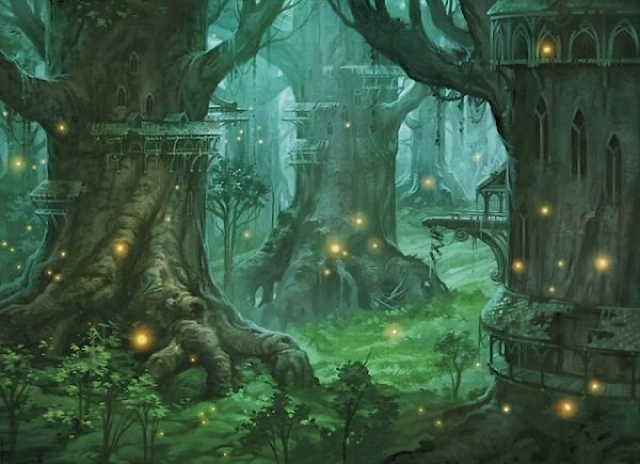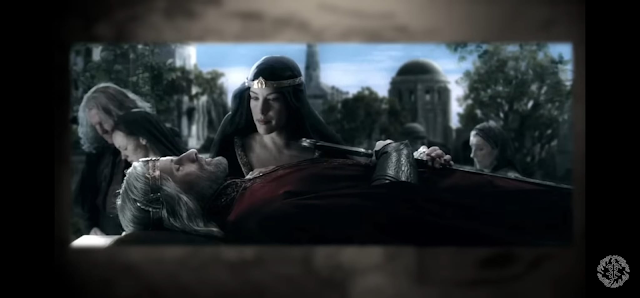Being the last day of 2022 I wish to remember the poems and songs of JRR Tolkien speaking of love and lost, wander and thrall. Within the sad tales of Middle Earth comes bred upon the human breast a wistfulness for better days when fellowship no longer strives with ruin and evil. Where the grand majesties set deep upon the hearts of all beings cannot undo themselves by heavy lost but finds within a deeper courage and longing to aright wrongs done and all be redeemed by torn atoning struggles for peace and justice founded upon the shattered halls of love unremitting its trials and longings.
R.E. SlaterDecember 31, 2022
@copyright R.E. Slater Publicationsall rights reserved
INDEX - History of Tolkien's Middle-Earth
 |
| Rendition of Middle Earth with enlargement link |
 |
| Elven Lands of the First Age |
 |
| The Elven Kingdom of Lothlorien |
 |
| Within the Halls of Lothlorien |
Lady Arwen, upon leaving the side of her Thrane and husband, Aragorn, and the whiten fortresses of Gondolin - where lay his tomb in the Hallows of Minas Tirith - thence journeyed onwards across Middle Earth to Lady Galadriel's remembered forest realms of Lothlorien. Then onwards to her Elven father Elrond's hidden realms founded upon the rocky chasms of Rivendale. And therefrom her father's lands Arwen thence turned westward towards the greensward troves of the misty Grey Havens once abounding it's vast inland and coastal realms under the tendering care of Elvish hands. Yet thereto did Arwen behold the fey wastelands conscripted in deeper losts than its lores and legends. For all she surveyed leaned upon her heavy heart the fast retreats of man's fourth age whose rule and imagination languished before her renown predecessor's gifted domains once wrapped in light and life within the deep and purposeful care of their Elven lord's faded dominions. - R.E. Slater
 |
| Faithful Arwen beside beloved Aragorn's side in his State of Rest |
 |
| Aragon's Tomb in the Hallows before the Citadel of Minas Tirith |
Eärendil was a mariner that tarried in Arvernien;
he built a boat of timber felled
in Nimbrethil to journey in;
her sails he wove of silver fair,
of silver were her lanterns made,
her prow was fashioned like a swan,
and light upon her banners laid.
In panoply of ancient kings,
in chainéd rings he armoured him;
his shining shield was scored with runes
to ward all wounds and harm from him;
his bow was made of dragon-horn,
his arrows shorn of ebony;
of silver was his habergeon,
his scabbard of chalcedony;
his sword of steel was valiant,
of adamant his helmet tall,
an eagle-plume upon his crest,
upon his breast an emerald.
Beneath the Moon and under star
he wandered far from northern strands,
bewildered on enchanted ways
beyond the days of mortal lands.
From gnashing of the Narrow Ice
where shadow lies on frozen hills,
from nether heats and burning waste
he turned in haste, and roving still
on starless waters far astray
at last he came to Night of Naught,
and passed, and never sight he saw
of shining shore nor light he sought.
The winds of wrath came driving him,
and blindly in the foam he fled
from west to east and errandless,
unheralded he homeward sped.
There flying Elwing came to him,
and flame was in the darkness lit;
more bright than light of diamond
the fire upon her carcanet.
The Silmaril she bound on him
and crowned him with the living light
and dauntless then with burning brow
he turned his prow; and in the night
from Otherworld beyond the Sea
there strong and free a storm arose,
a wind of power in Tarmenel;
by paths that seldom mortal goes
his boat it bore with biting breath
as might of death across the grey
and long forsaken seas distressed;
from east to west he passed away.
Through Evernight he back was borne
on black and roaring waves that ran
o'er leagues unlit and foundered shores
that drowned before the Days began,
until he heard on strands of pearl
where ends the world the music long,
where ever-foaming billows roll
the yellow gold and jewels wan.
He saw the Mountain silent rise
where twilight lies upon the knees
of Valinor, and Eldamar
beheld afar beyond the seas.
A wanderer escaped from night
to haven white he came at last,
to Elvenhome the green and fair
where keen the air, where pale as glass
beneath the Hill of Ilmarin
a-glimmer in a valley sheer
the lamplit towers of Tirion
are mirrored on the Shadowmere.
He tarried there from errantry,
and melodies they taught to him,
and sages old him marvels told,
and harps of gold they brought to him.
They clothed him then in elven-white,
and seven lights before him sent,
as through the Calacirian
to hidden land forlorn he went.
He came unto the timeless halls
where shining fall the countless years,
and endless reigns the Elder King
in Ilmarin on Mountain sheer;
and words unheard were spoken then
of folk of Men and Elven-kin,
beyond the world were visions showed
forbid to those that dwell therein.
A ship then new they built for him
of mithril and of elven-glass
with shining prow; no shaven oar
nor sail she bore on silver mast:
the Silmaril as lantern light
and banner bright with living flame
to gleam thereon by Elbereth
herself was set, who thither came
and wings immortal made for him,
and laid on him undying doom,
to sail the shoreless skies and come
behind the Sun and light of Moon.
From Evereven's lofty hills
where softly silver fountains fall
his wings him bore, a wandering light,
beyond the mighty Mountain Wall.
From World's End there he turned away,
and yearned again to find afar
his home through shadows journeying,
and burning as an island star
on high above the mists he came,
a distant flame before the Sun,
a wonder ere the waking dawn
where grey the Norland waters run.
And over Middle-earth he passed
and heard at last the weeping sore
of women and of elven-maids
in Elder Days, in years of yore.
But on him mighty doom was laid,
till Moon should fade, an orbéd star
to pass, and tarry never more
on Hither Shores where Mortals are;
for ever still a herald on
an errand that should never rest
to bear his shining lamp afar,
the Flammifer of Westernesse.
An Elven-maid there was of old,
A shining star by day:
Her mantle white was hemmed with gold,
Her shoes of silver-grey.
A light was on her hair
As sun upon the golden boughs
In Lórien the fair.
And fair she was and free;
And in the wind she went as light
As leaf of linden-tree.
By water clear and cool,
Her voice as falling silver fell
Into the shining pool.
In sunlight or in shade;
For lost of yore was Nimrodel
And in the mountains strayed.
Beneath the mountain-lee
Awaited her for many a day
Beside the roaring sea.
Arose, and loud it cried,
And drove the ship from elven-strands
Across the streaming tide.
The mountains sinking grey
Beyond the heaving waves that tossed
Their plumes of blinding spray.
Now low beyond the swell,
And cursed the faithless ship that bore
Him far from Nimrodel.
A lord of tree and glen,
When golden were the boughs in spring
In fair Lothlórien.
As arrow from the string,
And dive into the water deep,
As mew upon the wing.
The foam about him shone;
Afar they saw him strong and fair
Go riding like a swan.
And on the Hither Shore
No tidings Elven-folk have heard
Of Amroth evermore.
I sang of leaves, of leaves of gold, and leaves of gold there grew:
Of wind I sang, a wind there came and in the branches blew.
Beyond the Sun, beyond the Moon, the foam was on the Sea,
And by the strand of Ilmarin there grew a golden Tree.
Beneath the stars of Ever-eve in Eldamar it shone,
In Eldamar beside the walls of Elven Tirion.
There long the golden leaves have grown upon the branching years,
While here beyond the Sundering Seas now fall the Elven-tears.
O Lórien! The Winter comes, the bare and leafless Day;
The leaves are falling in the stream, the river flows away.
O Lórien! Too long I have dwelt upon this Hither Shore
And in a fading crown have twined the golden elanor.
But if of ships I now should sing, what ship would come to me,
What ship would bear me ever back across so wide a Sea?
*Or there maybe 'tis cloudless night
and swaying beeches bear
the Elven-stars as jewels white
amid their branching hair.
Day is ended, dim my eyes,
but journey long before me lies.
Farewell, friends! I hear the call.
The ship's beside the stony wall.
Foam is white and waves are grey;
beyond the sunset leads my way.
Foam is salt, the wind is free;
I hear the rising of the Sea.
Farewell, friends! The sails are set,
the wind is east, the moorings fret.
Shadows long before me lie,
beneath the ever-bending sky,
but islands lie behind the Sun
that I shall raise ere all is done;
lands there are to west of West,
where night is quiet and sleep is rest.
Guided by the Lonely Star,
beyond the utmost harbour-bar
I'll find the havens fair and free,
and beaches of the Starlit Sea.
Ship, my ship! I seek the West,
and fields and mountains ever blest.
Farewell to Middle-Earth at last.

NOW PLAYING (5)































